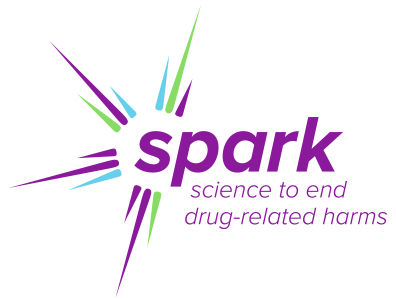Funded by the O. Wayne Rollins foundation, Spark was established in 2018 to help end suffering from substance use disorders and related harms, like overdoses, hepatitis C, HIV, and neonatal opioid withdrawal syndrome. Overdoses and other drug-related harms have become so pervasive that they have contributed to a multi-year decline in US life expectancy, the longest period of sustained decline in this country since WWI. Some subpopulations, like rural adults and Black and Latinx adults, are bearing a particularly heavy burden of drug-related suffering.
Unfortunately, there is a wide implementation chasm for harm reduction services in the US (the “implementation chasm” is the gap between scientific advances and on-the-ground practices). According to the Surgeon General, for example, just 12% of people living with a substance use disorder received specialty treatment in the past year. Spatial access to services is also highly variable across the US. Until recently, for example, the state of Georgia had just one syringe service program, despite these programs’ documented impacts on HIV transmission and linkage to treatment.
Together, Emory faculty, staff, and students and collaborators are advancing research and developing interventions to close this implementation chasm and end drug-related suffering. Since 1990, Emory faculty have been awarded $301.40 million in drug- and alcohol-related grants from the National Institutes of Health alone. These projects encompass drug discovery, novel clinical interventions, community-based interventions, and policy research. A sampling of some current projects includes:
- David Weinshenker, Professor in the Department of Human Genetics within the School of Medicine: No current treatments can prevent the development of opioid addiction. Dr. Weinshenker and his team are studying how a neuropeptide called galanin interferes with the ability of opioids to activate the brain’s dopamine system and cause addiction. To learn more about Dr. Weinshenker’s research, click here: http://genetics.emory.edu/research/weinshenker/
- Shannon Gourley, Associate Professor in the Departments of Pediatrics and Psychiatry within the School of Medicine and Yerkes National Primate Research Center: Dr. Gourley’s lab studies the neurobiological mechanisms by which habits form, and how cocaine impacts habit structure and strength. New knowledge regarding how habits can be “broken” could provide valuable insight into expediting recovery. To learn more about Dr. Gourley’s research, click here: https://gourleylab.wixsite.com/emory
- Rohan Palmer, Assistant Professor in the Department of Psychology within the Emory College of Arts and Sciences: Dr. Rohan’s Behavioral Genetics of Addiction Laboratory uses genetically informed samples to understand why some people are more likely to develop substance use problems, and to identify the risk pathways that lead people to misuse substances. Ongoing studies leverage large biobank samples and college students participating in the prospective MAPme Project at Emory University. To learn more about Dr. Palmer’s research, click here: https://scholarblogs.emory.edu/bgalab/
- Courtney Yarbrough, Rollins Assistant Professor in the Department of Health Policy and Management within the Rollins School of Public Health. Buprenorphine, a leading and effective medication for opioid use disorder, is taken by only a small minority of patients, in part because of its cost. In mid-2018, the most common buprenorphine formulation became available in a generic form at a substantially lower cost. Dr. Yarbrough and her team will analyze data from state prescription drug monitoring programs to understand how the entry of this cheaper, generic formulation changed treatment initiation and duration. To learn more about Dr. Yarbrough’s research, click here: https://sph.emory.edu/faculty/profile/index.php?FID=8943
- Janet Cummings, Associate Professor in the Department of Health Policy and Management in the Rollins School of Public Health: Low-income and publicly insured populations rely on a patchwork of three different safety-net systems (primary care, substance use, and mental health) to access treatment for substance use disorders. Dr. Cummings and her team are studying the expansion of substance use treatment across these systems, and how differential growth in the number of facilities and availability of services affects treatment disparities for rural and other underserved populations. To learn more about Dr. Cumming’s research, click here: https://sph.emory.edu/faculty/profile/index.php?FID=8613
- Kelli Komro, Professor in the Department of Behavioral, Social, and Health Education Sciences in the Rollins School of Public Health: The national opioid crisis has disproportionately burdened rural populations and American Indian populations. Dr. Komro and her Emory colleagues are partnering with the Cherokee Nation to implement and evaluate a theory-based, integrated multi-level community intervention to prevent the onset and escalation of opioid and other drug misuse in the Cherokee Nation. To learn more about Dr. Komro’s research, click here: https://sph.emory.edu/faculty/profile/index.php?FID=8811
Emory faculty, students, and staff have the honor of partnering with multiple governmental and community-based organizations that are dedicated to ending drug-related suffering. These vital organizations include the Atlanta Harm Reduction Coalition (https://atlantaharmreduction.org/) and the Georgia Department of Health’s Opioid Surveillance team (https://dph.georgia.gov/drug-surveillance-unit)
We are delighted that you have visited our site to learn more about us. Please contact us if there is any way that we can support your work.
Warmly,
Hannah LF Cooper, ScD
Rollins Chair in Substance Use Disorders
